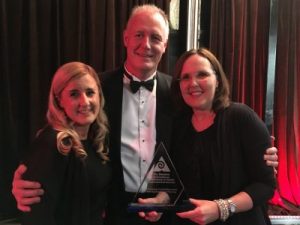Researchers awarded at APAC Forum

Project officer Tanya Milburn, Dr John Wakefield and Professor
Louise Cullen at the APAC Forum Gala Dinner in Sydney.
The Accelerated Chest Pain Risk Evaluation (ACRE) Project, led by RBWH Emergency Physician Professor Louise Cullen and Cardiologist Professor Will Parsonage, took home the prestigious Ko Awatea International Excellence in Health Improvement Award at the APAC Forum in September 2016.
The project, which has influenced the national guidelines for both the National Heart Foundation and the Cardiac Society of Australia and New Zealand in 2016, was awarded for translating research into clinical practice, enabling diagnosis of heart attacks faster and providing quicker treatment to patients presenting with chest pain in Queensland Emergency Departments (EDs).
Whilst one in five patients with chest pain suffers a heart attack, the rest are diagnosed with indigestion or other less serious conditions. The team has since introduced an accelerated diagnostic protocol (ADP) across Queensland’s EDs, which provides guidelines to safely and quickly deliver care to patients who are not suffering a heart attack. The ADP has redesigned the evaluation and management of low-intermediate risk patients presenting with chest pain, and has been rolled out into EDs in 19 hospitals statewide, including The Prince Charles Hospital, Caboolture and Redcliffe.
Professor Cullen says she felt honoured to receive international recognition for the project, and she hopes the ADP will become standard practice within EDs
Australia-wide.
“This has reduced the demands on our emergency and inpatient services. We have been able to reassure patients that they have not suffered a heart attack
sooner,” Professor Cullen says.
“We have seen a decrease in the total average emergency department length of stay by 34 minutes, which has improved each hospital’s performance against National Emergency Access Targets.”
Professor Cullen says the success of the project would not have been possible without the support of Metro North and Queensland Health. It has led to cost savings of more than $13.5 million, money which is being reinvested in other health services.
“Translating the research into clinical practice was thanks to the enthusiasm and support of Emergency and Cardiology Department staff in the 19 ACRE hospitals,” she says.
